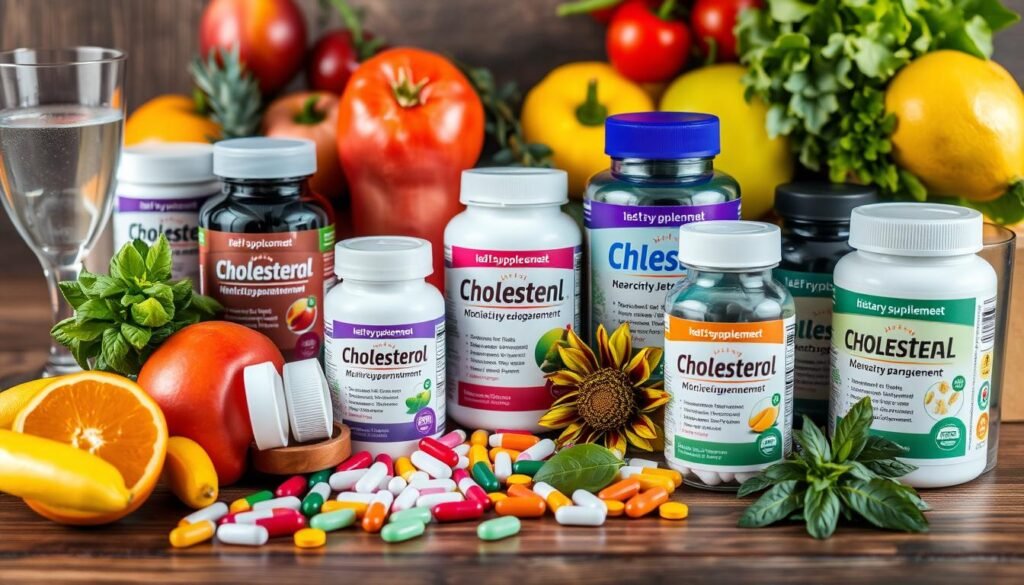Wondering why keeping your cholesterol in check is key to your health? Heart disease is a top killer, and cholesterol plays a big role in it. The American Heart Association tells us it’s not just about dodging meds. It’s also about choosing the right foods, staying active, and changing your lifestyle. This piece will share some top tips to manage your cholesterol and boost your health.
Key Takeaways
- Cholesterol management is vital for heart health.
- Adopting a healthy diet can significantly lower cholesterol levels.
- Regular exercise plays a key role in cholesterol prevention.
- Lifestyle modifications, such as quitting smoking, can benefit overall health.
- Regular cholesterol screenings help in monitoring levels effectively.
Understanding Cholesterol and Its Impact on Health
It’s crucial to understand cholesterol since it affects our health. Cholesterol is a waxy substance in our bodies. It helps in making hormones, vitamin D, and aids in digestion.
LDL (low-density lipoprotein) and HDL (high-density lipoprotein) are the main types of cholesterol. LDL is called “bad” cholesterol because it can cause plaque to build up in arteries. This increases heart disease risk. On the other hand, HDL is “good” cholesterol. It takes cholesterol from arteries to the liver to be removed. This action protects against heart disease.
Our genes, diet, and lifestyle impact our cholesterol levels. Knowing how cholesterol affects your health helps you make better choices. Regular checks are important.
| Cholesterol Type | Description | Health Impact |
|---|---|---|
| LDL (Low-Density Lipoprotein) | Known as “bad” cholesterol | High levels can lead to heart disease |
| HDL (High-Density Lipoprotein) | Known as “good” cholesterol | Helps remove cholesterol from arteries |
| Total Cholesterol | Combination of LDL, HDL, and triglycerides | High total cholesterol can indicate risk |
Understanding your cholesterol levels is key to better health. Knowing about the different types helps you manage them. This leads to healthier choices.
Cholesterol Prevention Strategies for a Healthy Diet
Diet is key to keeping cholesterol at good levels. Adding certain foods to your meals helps a lot. Let’s talk about foods that make your lifestyle healthier.
Incorporating Lipid-Lowering Foods
Want better cholesterol numbers? Think about eating more of these:
- Oats
- Barley
- Beans
- Nuts
- Fatty fish like salmon
These items help lower bad LDL cholesterol for a healthier heart. Studies, like those in the American Journal of Clinical Nutrition, show they really work.
Foods to Avoid for Better Cholesterol Levels
It’s also smart to cut back on certain foods. Try to eat less of these:
- Trans fats in fried foods and snacks
- Saturated fats in red meat and full-fat dairy
These fats can mess with your cholesterol, raising the bad kind. A Mediterranean diet, packed with whole grains, fruits, veggies, and healthy fats, is a good choice.
Developing an Effective Exercise Routine
Moving around a lot is key to keeping your cholesterol in check. A good workout plan does more than make you healthier. It also plays a big part in managing cholesterol. The CDC says we need at least 150 minutes of exercise like fast walking every week. This is a good base for adding more physical activity to your day.
The Benefits of Regular Physical Activity
Being active helps your heart in many ways. It can raise your good cholesterol (HDL) and lower the bad one (LDL). Simple activities like walking, running, biking, and swimming are great for your heart. They help keep your cholesterol levels right and lead to a healthier life.
Recommended Types of Exercises for Cholesterol Management
For better heart health and cholesterol, you can try different workouts:
- Walking: An easy and effective way to stay active.
- Cycling: Riding a bike, indoors or outdoors, is great for the heart.
- Swimming: This is easy on your body and fun, while it boosts heart health.
- Strength Training: Very important for total fitness, it fits well with cardio to build muscle.
Mixing these exercises gives you a varied routine. This leads to better cholesterol control and healthier living.
Medication Management for Cholesterol Control
Managing meds is key for keeping cholesterol in check, mainly if lifestyle changes don’t work. Statins are super common for lowering cholesterol. They’re super important for those facing heart disease risks. These meds block a liver enzyme that makes cholesterol, cutting down bad cholesterol levels.
If statins don’t work or cause issues, doctors have other options. They might pick PCSK9 inhibitors or Ezetimibe. PCSK9 inhibitors make the liver remove more bad cholesterol from the blood. Ezetimibe cuts down on cholesterol absorption in your guts. Each medication type has its own ways of working, with benefits and side effects. That’s why talking to a doctor is a must.
Keeping an eye on cholesterol and tweaking meds is crucial for the best results. It’s smart to chat regularly with your doctor to see how well your medication plan is working. Following advice from cholesterol medication recommendations helps get care that fits you perfectly.
| Medication Type | Mechanism of Action | Common Benefits | Considerations |
|---|---|---|---|
| Statins | Inhibit cholesterol production in the liver | Reduces LDL levels significantly | May have side effects like muscle pain |
| PCSK9 Inhibitors | Help the liver absorb more LDL from the blood | Lower LDL levels even further | Often used when statins are ineffective |
| Ezetimibe | Reduces cholesterol absorption in the intestines | Can be used alone or with statins for better control | May interact with other medications |
Implementing Lifestyle Modifications
Making changes in your lifestyle is key to managing cholesterol. Quitting smoking and drinking less alcohol are very important. These changes can help your heart and lower your risk of heart disease.
Quitting Smoking and Its Effects on Cholesterol
Stopping smoking is great for your heart. The CDC says that quitting can raise your HDL, or “good,” cholesterol. Higher HDL helps to lower heart disease risk. Not smoking also improves your overall heart health.
The Role of Alcohol Moderation
Drinking alcohol in moderation can be part of these changes. Some research shows it might help your HDL cholesterol. But, drinking too much is bad for your cholesterol and health. Limiting alcohol lets you enjoy its benefits without the risks.
Quitting Smoking and Alcohol Moderation are big steps towards better heart health. Want more tips on managing cholesterol? Check out this resource.
The Importance of Cholesterol Screening
Getting your cholesterol checked is a big part of staying healthy. It’s something you shouldn’t overlook. The Preventive Care world sees it as crucial for keeping your heart in good shape. Experts like the American Heart Association say we should start getting tested at 20 years old.
Then, you should get checked every four to six years. But if you’re at high risk, you’ll need to do it more often.
Knowing your cholesterol numbers, like your HDL and LDL, helps you take charge of your health. Finding out early if your cholesterol is high means you can start fixing the problem sooner. Regular check-ups are key.
These check-ups catch problems before they turn into big heart issues.
Being in the know about your cholesterol lets you make smart choices for your health. It can help you avoid heart blockages and other serious problems. To sum up, getting your cholesterol tested regularly helps you live a longer, healthier life.

| Age Group | Screening Frequency | Additional Considerations |
|---|---|---|
| 20-39 | Every 4-6 years | Based on risk factors |
| 40 and older | Every 1-2 years | Increased monitoring recommended |
| High-risk individuals | As recommended by clinician | May require more frequent testing |
Understanding Risk Factor Reduction
Knowing your personal risk factors is key for good cholesterol health. These factors range from age and gender to lifestyle choices like your diet and how much you move. Working on these risk factors helps a lot in improving your health.
Identifying Personal Risk Factors
It’s important to know your own risk factors to manage your cholesterol well. Here are the common ones:
- Age: The older you get, the higher your risk.
- Gender: Men often have higher risks earlier than women.
- Family History: Your genes can play a big role.
- Diet: Bad food choices can push your cholesterol up.
- Lifestyle Habits: Not moving much and smoking are bad for your cholesterol.
Looking at these areas, you can make plans to reduce your risks. Check out how to do this for your situation.
How to Monitor and Adjust Your Risk Profile
Keeping an eye on your risk profile needs effort and a positive outlook towards health. See your doctor regularly to set good cholesterol goals. Apps for health can also track your eating, how much you move, and your cholesterol numbers. Writing in a health journal is also helpful to:
- Document food intake: Seeing what you eat helps you make better choices.
- Record exercise: Keeping track of exercise can inspire you to do more.
- Reflect on health goals: Thinking about your goals helps keep you on track.
By monitoring and changing your risk factors, you can get healthier. Staying aware and making changes helps improve your overall well-being. This makes risk factor reduction truly powerful.
Dietary Supplements for Cholesterol Management
Dietary supplements can majorly impact cholesterol management. They are aimed at improving heart health. Certain supplements have been shown to lower LDL cholesterol while boosting overall health.
Omega-3 Fatty Acids are highly regarded in this realm. These are found in fish oil. They can reduce triglycerides, helping the heart stay healthy. The American Heart Association believes Omega-3s help manage cholesterol.
Fiber supplements are another good choice. They come from psyllium husk and oat bran, offering soluble fiber that reduces cholesterol’s entry into the bloodstream. They’re great for those not getting enough fiber from food alone.
Plant sterols make up another vital supplement category. Present in tiny amounts in plant foods, they lower LDL cholesterol by blocking its absorption in the intestines. Using products enriched with plant sterols can boost cholesterol levels significantly.
However, it’s crucial to talk with a healthcare provider before starting these supplements. This is key for those on cholesterol medications to avoid unwanted effects.

| Supplement Type | Benefits | Recommended Dosage |
|---|---|---|
| Omega-3 Fatty Acids | Reduces triglycerides, improves heart health | 1-4 grams per day |
| Fiber Supplements | Decreases cholesterol absorption | 5-10 grams of soluble fiber per day |
| Plant Sterols | Lowers LDL cholesterol levels | 2 grams per day |
Cholesterol Prevention Strategies: Top Tips for Success
Making a plan to prevent high cholesterol is key. It means tailoring strategies to fit each person’s life. A Customized Action Plan helps manage cholesterol with diet, exercise, and sometimes medication.
Creating a Customized Action Plan
An effective Customized Action Plan is like a guide. It should include these parts:
- Dietary Changes: Eat more foods with omega-3s, fiber, and plant sterols. Cut down on saturated fats.
- Exercise Regimen: Try for 150 minutes of exercise, like walking, every week.
- Medication Adherence: Always take medicine as directed and check with doctors when needed.
Tracking Progress and Making Adjustments
It’s important to keep an eye on how you’re doing. Using tools like a food diary helps watch what you eat. Health check-ups are also crucial for keeping plans up to date. Here’s how you can track your progress:
| Tracking Method | Purpose | Frequency |
|---|---|---|
| Food Diary | Monitor daily food intake | Daily |
| Exercise Log | Record physical activity | Weekly |
| Health Check-ins | Review cholesterol levels and medications | Monthly or as advised |
To keep moving forward, set realistic goals. Find friends or groups who support you. Be ready to change your plan as needed. Following these tips can help you take charge of your cholesterol health.
Seeking Support and Professional Guidance
Managing cholesterol levels is not easy. Getting help from skilled professionals is key to long-term health. Doctors and dietitians offer personalized advice for your unique health needs.
Healthcare Providers are important for creating a good cholesterol plan. They suggest regular checks to keep an eye on cholesterol. This helps adjust lifestyle or medication when necessary.
Getting advice from pros helps make smarter choices about diet and exercise. Working with dietitians who know about heart health is useful. They tell you about foods to eat and avoid. Using resources like the American Heart Association also helps a lot.
Support groups provide motivation and accountability. Sharing stories and tips with others is very helpful. It makes a big difference in keeping cholesterol at healthy levels.

Working together with healthcare providers and support groups is great for health. It helps patients and professionals keep cholesterol under control with informed decisions.
Conclusion
It’s crucial to have effective plans for keeping cholesterol in check to stay healthy. This article covered many ways to do this. One can eat better, get active, make changes to their habits, and check their cholesterol regularly.
Adding heart-healthy foods to your diet and exercising often are great steps towards good health. It’s also helpful to shake up your daily routine for the better. Getting your cholesterol checked lets you know if you need to tweak your plan.
With determination and the right info, anyone can start improving their cholesterol levels. Focusing on managing cholesterol now ensures a healthier future for everyone.